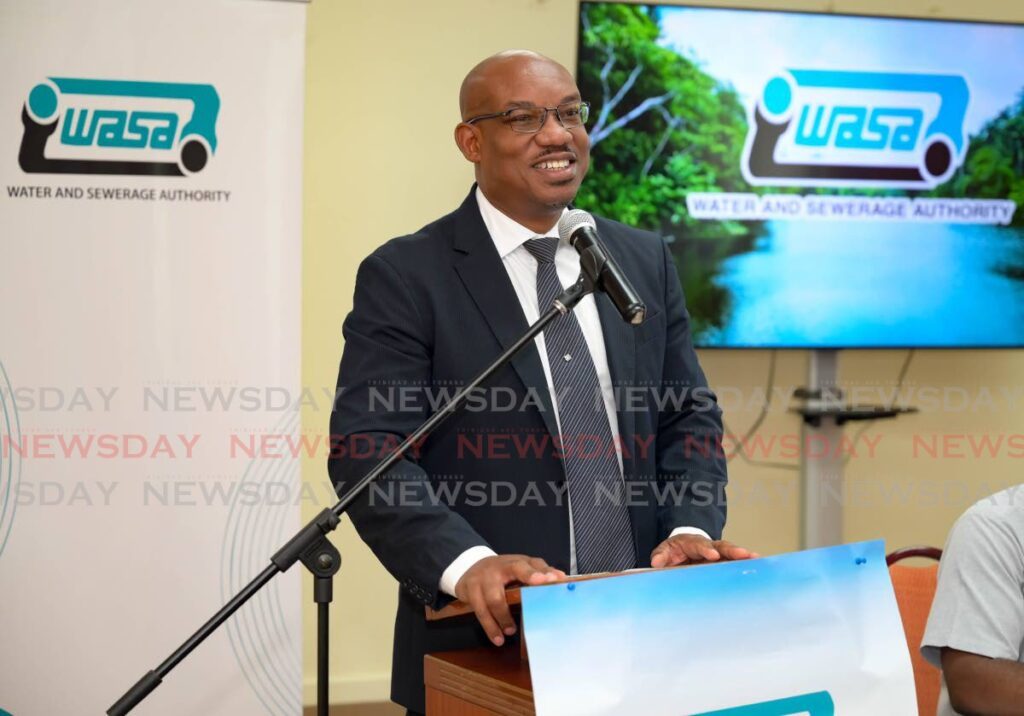WASA CEO: Metering must be pursued at some point

NEW Water and Sewerage Authority (WASA) CEO Keithroy Halliday has said introducing meters is something the authority must pursue.
Halliday was speaking on January 22 at a media conference at Central Administrative Services, Tobago (CAST), Scarborough.
Halliday, who assumed duty on December 1, 2024, said among his objectives are to restore the public's confidence in WASA and to make the organisation more relevant to today's challenges.
Pivotal to achieving these goals, he said, is to get the public to change their mindset when it comes to water conservation.
"It must not be a reactionary measure during dry season. It has to be habitual," he said.
During harsh dry seasons, WASA implements a ban on the use of hoses, sprinklers, fountains and other outdoor water systems. It also urged people to be conservative in their usage.
Halliday said, "We have to make sure it's inculcated in our culture that water is expensive, it is a scarce resource. We have to find ways of covering that cost, and that leads to the metering."
Halliday said there are many benefits to metering.
"Metering does a number of things, and it something we have to pursue at some point.
"What it does is, it holds each of us accountable for our water usage. Metering in most countries really pushes to that, inevitably."
However, Halliday said there are many factors, particularly social, that must be considered.
"(We) understand water is viewed as a social good. It is a critical essential service, and the way you manage it has to take into account those in society that are so challenged...It's not a simple thing to say you're going to meter...It is a complex issue that needs to be addressed."
Former public utilities minister Robert Le Hunte in 2019 said the national roll-out of a water-meter system would cost $1.5 billion.
It was reported that there was a disagreement in Cabinet in 2020 over his proposal to introduce this system. He later resigned as minister over "a result of professional conflict on policy positions."
On leaks and repairs, Halliday said, "It's being tackled from a number of fronts."
He said the WASA Services app allows for interacting with customers.
"We have a mobile app that we've been using. That app has been reformulated and is being designed to give customers much more interactive experience and feedback...for all leak requests that are sent to WASA."
He said the new features will be rolled out shortly, possibly by the end of January.
"Behind the scene is the introduction of our operational control centre. That is a fantastic facility, really quite impressive. That is what's supporting that app to make sure we have the right linkages, from a technology standpoint, to our contact centre, to create a dashboard that we use internally to track and respond as well, with the creating of worksheets..."
He said reducing leaks and unaccounted-for-water is a priority.
"If we can tackle that aggressively, then we should see (fewer) leaks, less loss of water."
He said leaks would cause WASA to have to pump more water, and it would put the network under pressure and strain the already ageing infrastructure.
He said the use of pressure-management devices "would allow us to gauge the flows and automatically respond. Where pressure is too high, we know to reduce...That's all in a bid to reduce incidents of leaks."
Halliday was asked to respond to Public Utilities Minister Marvin Gonzales statement in August last year that 75 per cent of Tobago would receive a 24/7 supply of water by the end of 2024.
Halliday said the issue was one of timing and funding to make that a reality.
"Given the landscape we're working with and how spread the population is – some are in quarters that are difficult to reach – it means that considerable funding is required."
He said WASA often has tough decisions to make for the greater good.
"Sometimes in our prioritisation we aim to satisfy those densely populated areas, because you (get) better bang for buck – not that anyone is less important, but you're able to deal with the needs of much more people than those who are much more remote.
"The further remote you are, the higher in elevation, the more difficult it is to get you (a regular supply) – the much more cost it is for the authority. Part of the authority's expense involved is its ability to pump. So we carry a significant electrical cost, and this is a cost we have to find ways of mitigating."
He said Tobago is in a more advanced state thanTrinidad and the authority is "pretty pleased with the way Tobago is going in terms of its 24-hour supply (goal) and reliability standpoint."
Halliday noted that the island has seven surface water treatment plants and 25 wells.
Brian Williams, director, Tobago water management district, WASA, outlined some of its projects to improve water supply there.
He said the sod will be turned for a the design and construction of new intake – 2.1 million gallons – at Goldsborough river next week, and the de-silting of the Hillsborough Dam has also improved the supply there.
In addition to several booster stations on the island, he said more are under way, including James Street in Goodwood and at the Castara housing development.
The construction of a 50,000-imperial-gallon tank at Bloody Bay and upgrade of the Bloody Bay boosters are expected to mitigate some of the challenges in that area.
Halliday said the second tranche of a US$315 million loan from the Inter American Development Bank will soon be released and will help fund a number of WASA's projects.
He said within the last six months, it has been managing close to 190 projects, with several already completed and many others to be completed in 2025.

Comments
"WASA CEO: Metering must be pursued at some point"